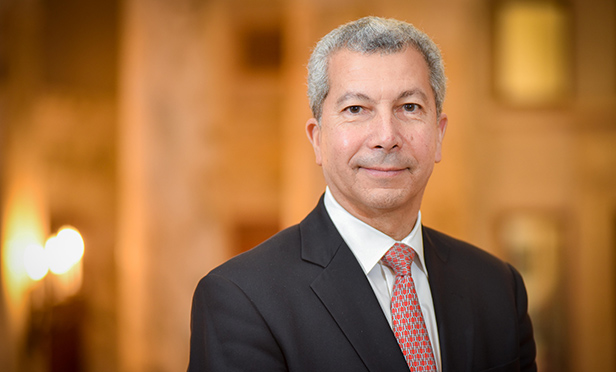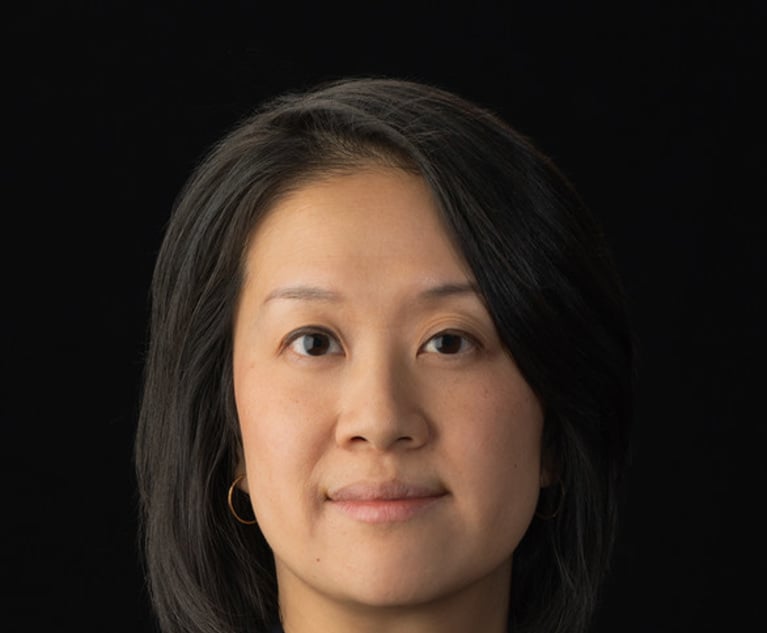With Diversity Stagnating, NYC Bar Association Launches Major Effort to Help Young Students Become Lawyers
"Given the resources that the legal profession wields and the prominent and near universal calls for greater diversity in the profession, the lack of progress for Black/African American and Latinx attorneys presents a critical challenge demanding immediate attention," a city bar association task force said.
May 20, 2019 at 09:17 AM
5 minute read
 Roger Juan Maldonado. Photo by David Handschuh/NYLJ.
Roger Juan Maldonado. Photo by David Handschuh/NYLJ.
Saying that progress toward diversity in the New York City legal profession has stalled, the city bar association is announcing today that it plans to partner with schools, government agencies, law firms, nonprofits and the courts to reach would-be lawyers as early as elementary school and mentor them through law school graduation and beyond.
Roger Juan Maldonado, president of the city bar, will tell the association's members on Tuesday that he's dedicating his last year in office to marshaling the resources of the profession to dramatically increase the number of law school graduates of color.
The plan is in response to the findings of a city bar task force, which is releasing a report today that found that too few applicants of color are getting law degrees. Educational deficits, overwhelming life challenges and feelings of exclusion from prelaw programs prevent diverse students from obtaining law degrees, the task force concluded.
“Given the resources that the legal profession wields and the prominent and near universal calls for greater diversity in the profession, the lack of progress for Black/African American and Latinx attorneys presents a critical challenge demanding immediate attention,” the task force said in its report, “Sealing the Leaks: Recommendations to Diversify and Strengthen the Pipeline to the Legal Profession.”
Creating such a transformation has to be the responsibility of the entire legal community, not just those lawyers who are from underrepresented groups, Maldonado said. To encourage that, the city bar will be lobbying law firms to count as pro bono hours time spent on programs that mentor students who want to pursue a law degree. The association also wants lawyers to receive CLE credit for taking part.
“You want to make clear to all members of the city bar association that they have a duty to do more than just pay lip service,” he said. “To make a difference, you have to engage.”
The city bar has already reached out to the New York City school system, the New York State Bar Association, the affinity bar and the court system. The details have yet to be worked out but the leaders have agreed to collaborate. While the effort is focusing on lawyers of color, young girls, the LGBTQ community and all other interested students would be encouraged to participate.
The idea is to reach would-be lawyers as early as third grade and provide support throughout their academic career to help them overcome obstacles. These programs would not necessarily be run by bar associations but the participation of lawyers is critical, Maldonado said.
“The legal profession must become unified in its support for effective programs and more urgent about this problem if meaningful progress is to be made,” the Legal Education and Pipeline Task Force urged in its report.
The city bar also intends to convene its most influential members from corporate law departments and law firms, academia and diversity organizations, educational and pipeline groups to serve on an Enhance Diversity in the Profession Committee. The committee would “incubate innovative ideas on how to address the pipeline challenges in education and the legal profession,” the city bar said.
To come to its conclusions, the task force, chaired by B. Seth Bryant, managing partner of Bryant Rabbino, analyzed data provided by 88 law firms that have made a commitment to diversity. That data was compiled in the city bar association's benchmarking report, which was released in November 2017. The report tracked the ranks of minority and women lawyers from first-year associates to firm leaders.
“The benchmarking report yields two overarching warning signs,” the task force said. “First, after decades of slow but seemingly steady advances in diversifying the profession, progress for Black/African American and Latinx lawyers, in particular, has appeared to stagnate or, based on recent trends, regressed. Second, erosion in the associate pipeline is depleting the pool of talent to leadership in firms.”
In 2016 in the New York City offices of the participating firms, 36.2% of first-year associates were minorities, the report found. But by the eighth year, only 20.5% of associates are minorities.
“Figuratively, the 'diversity pipeline' has been likened to a series of pipes that conduct candidates through the stages of the educational system and into the legal profession. The pipeline has serious breaches at the pre-professional level that disproportionately affect Black/African American and Latinx students who might otherwise be candidates for the legal profession,” the task force said. “As reflected in the benchmarking report, even for those students who make it to the profession, there appear to be embedded obstacles to success.”
Read More:
Bar Report Details Lag in Pay and Partnerships for Minorities, Women
This content has been archived. It is available through our partners, LexisNexis® and Bloomberg Law.
To view this content, please continue to their sites.
Not a Lexis Subscriber?
Subscribe Now
Not a Bloomberg Law Subscriber?
Subscribe Now
NOT FOR REPRINT
© 2025 ALM Global, LLC, All Rights Reserved. Request academic re-use from www.copyright.com. All other uses, submit a request to [email protected]. For more information visit Asset & Logo Licensing.
You Might Like
View All

Courts Beginning to Set Standards for Evidence Relying Upon Artificial Intelligence
4 minute read
NY Judge Admonished Over Contributions to Progressive Political Causes

Attorneys ‘On the ‘Move: Morrison Cohen Expands White Collar Practice; O’Melveny Brings Back Corporate Finance Partner
6 minute readTrending Stories
- 1'It's Not Going to Be Pretty': PayPal, Capital One Face Novel Class Actions Over 'Poaching' Commissions Owed Influencers
- 211th Circuit Rejects Trump's Emergency Request as DOJ Prepares to Release Special Counsel's Final Report
- 3Supreme Court Takes Up Challenge to ACA Task Force
- 4'Tragedy of Unspeakable Proportions:' Could Edison, DWP, Face Lawsuits Over LA Wildfires?
- 5Meta Pulls Plug on DEI Programs
Who Got The Work
Michael G. Bongiorno, Andrew Scott Dulberg and Elizabeth E. Driscoll from Wilmer Cutler Pickering Hale and Dorr have stepped in to represent Symbotic Inc., an A.I.-enabled technology platform that focuses on increasing supply chain efficiency, and other defendants in a pending shareholder derivative lawsuit. The case, filed Oct. 2 in Massachusetts District Court by the Brown Law Firm on behalf of Stephen Austen, accuses certain officers and directors of misleading investors in regard to Symbotic's potential for margin growth by failing to disclose that the company was not equipped to timely deploy its systems or manage expenses through project delays. The case, assigned to U.S. District Judge Nathaniel M. Gorton, is 1:24-cv-12522, Austen v. Cohen et al.
Who Got The Work
Edmund Polubinski and Marie Killmond of Davis Polk & Wardwell have entered appearances for data platform software development company MongoDB and other defendants in a pending shareholder derivative lawsuit. The action, filed Oct. 7 in New York Southern District Court by the Brown Law Firm, accuses the company's directors and/or officers of falsely expressing confidence in the company’s restructuring of its sales incentive plan and downplaying the severity of decreases in its upfront commitments. The case is 1:24-cv-07594, Roy v. Ittycheria et al.
Who Got The Work
Amy O. Bruchs and Kurt F. Ellison of Michael Best & Friedrich have entered appearances for Epic Systems Corp. in a pending employment discrimination lawsuit. The suit was filed Sept. 7 in Wisconsin Western District Court by Levine Eisberner LLC and Siri & Glimstad on behalf of a project manager who claims that he was wrongfully terminated after applying for a religious exemption to the defendant's COVID-19 vaccine mandate. The case, assigned to U.S. Magistrate Judge Anita Marie Boor, is 3:24-cv-00630, Secker, Nathan v. Epic Systems Corporation.
Who Got The Work
David X. Sullivan, Thomas J. Finn and Gregory A. Hall from McCarter & English have entered appearances for Sunrun Installation Services in a pending civil rights lawsuit. The complaint was filed Sept. 4 in Connecticut District Court by attorney Robert M. Berke on behalf of former employee George Edward Steins, who was arrested and charged with employing an unregistered home improvement salesperson. The complaint alleges that had Sunrun informed the Connecticut Department of Consumer Protection that the plaintiff's employment had ended in 2017 and that he no longer held Sunrun's home improvement contractor license, he would not have been hit with charges, which were dismissed in May 2024. The case, assigned to U.S. District Judge Jeffrey A. Meyer, is 3:24-cv-01423, Steins v. Sunrun, Inc. et al.
Who Got The Work
Greenberg Traurig shareholder Joshua L. Raskin has entered an appearance for boohoo.com UK Ltd. in a pending patent infringement lawsuit. The suit, filed Sept. 3 in Texas Eastern District Court by Rozier Hardt McDonough on behalf of Alto Dynamics, asserts five patents related to an online shopping platform. The case, assigned to U.S. District Judge Rodney Gilstrap, is 2:24-cv-00719, Alto Dynamics, LLC v. boohoo.com UK Limited.
Featured Firms
Law Offices of Gary Martin Hays & Associates, P.C.
(470) 294-1674
Law Offices of Mark E. Salomone
(857) 444-6468
Smith & Hassler
(713) 739-1250






